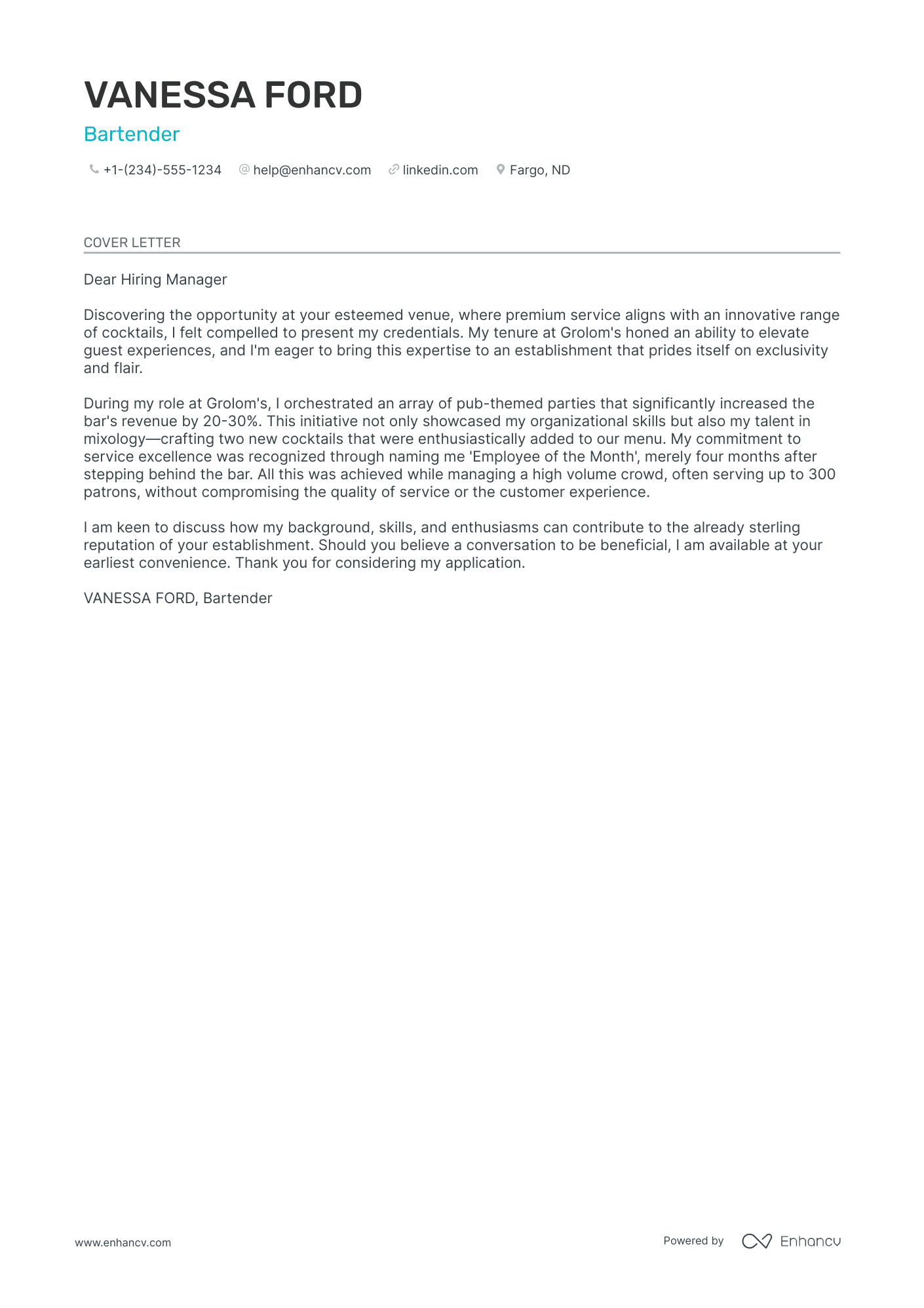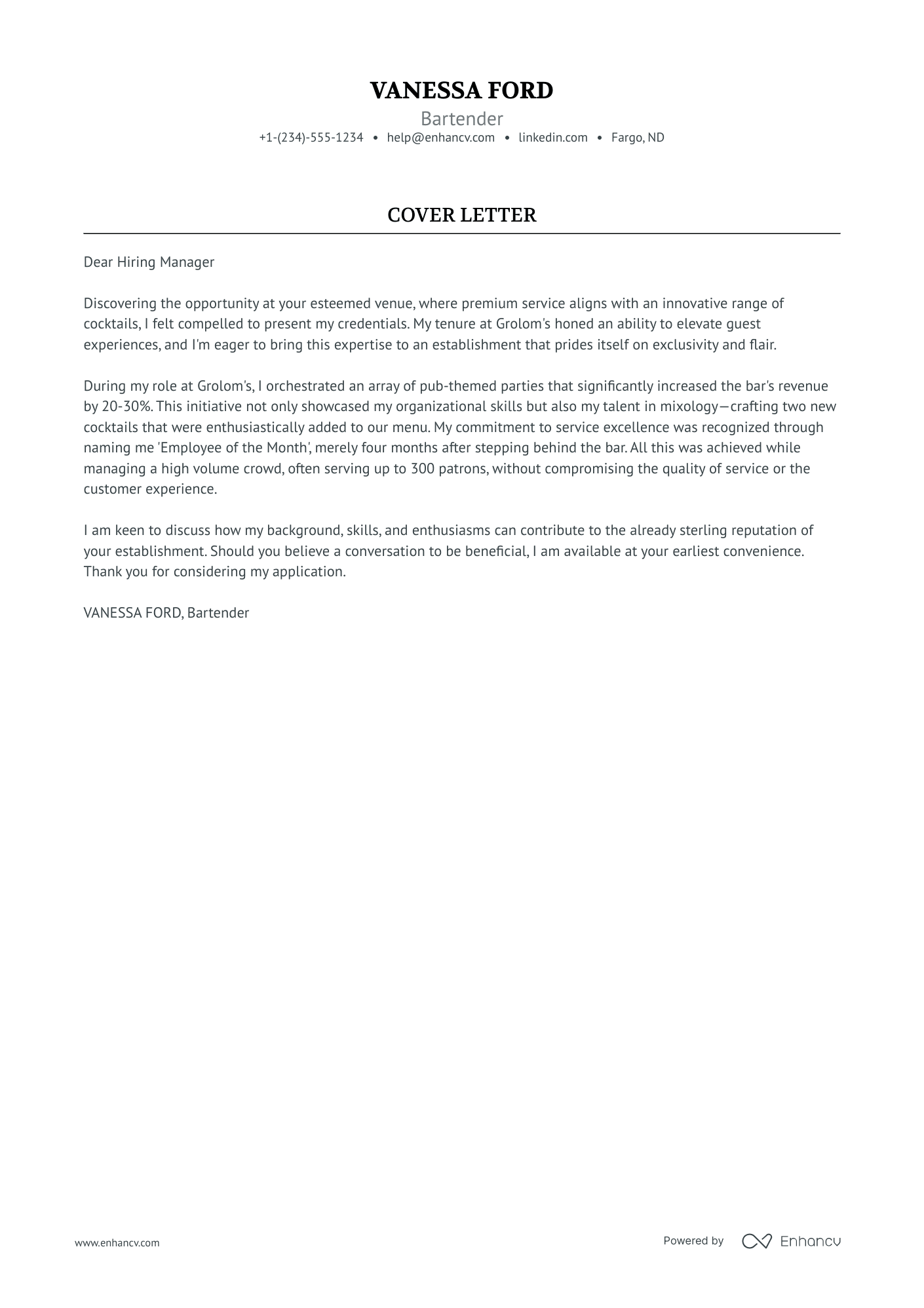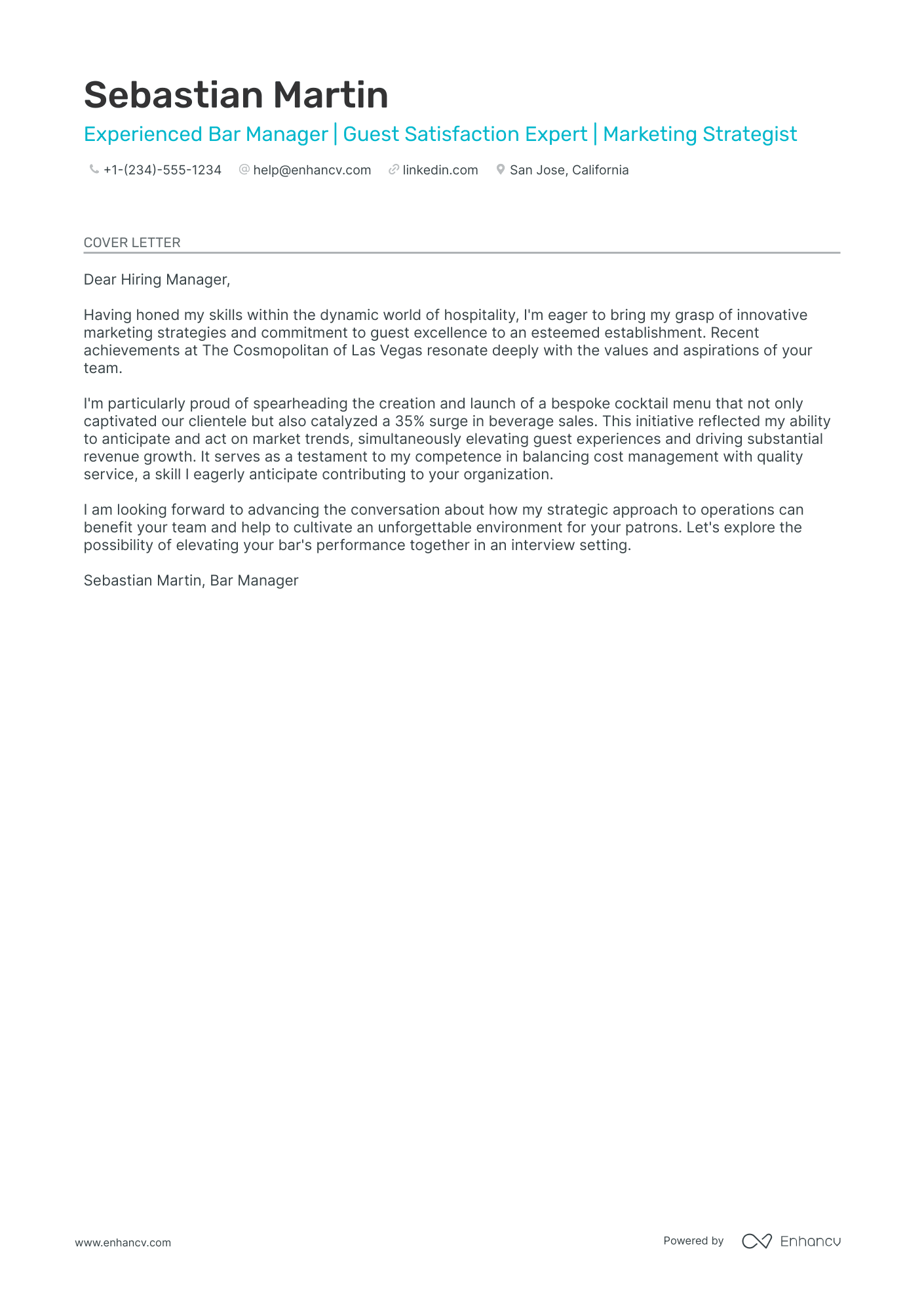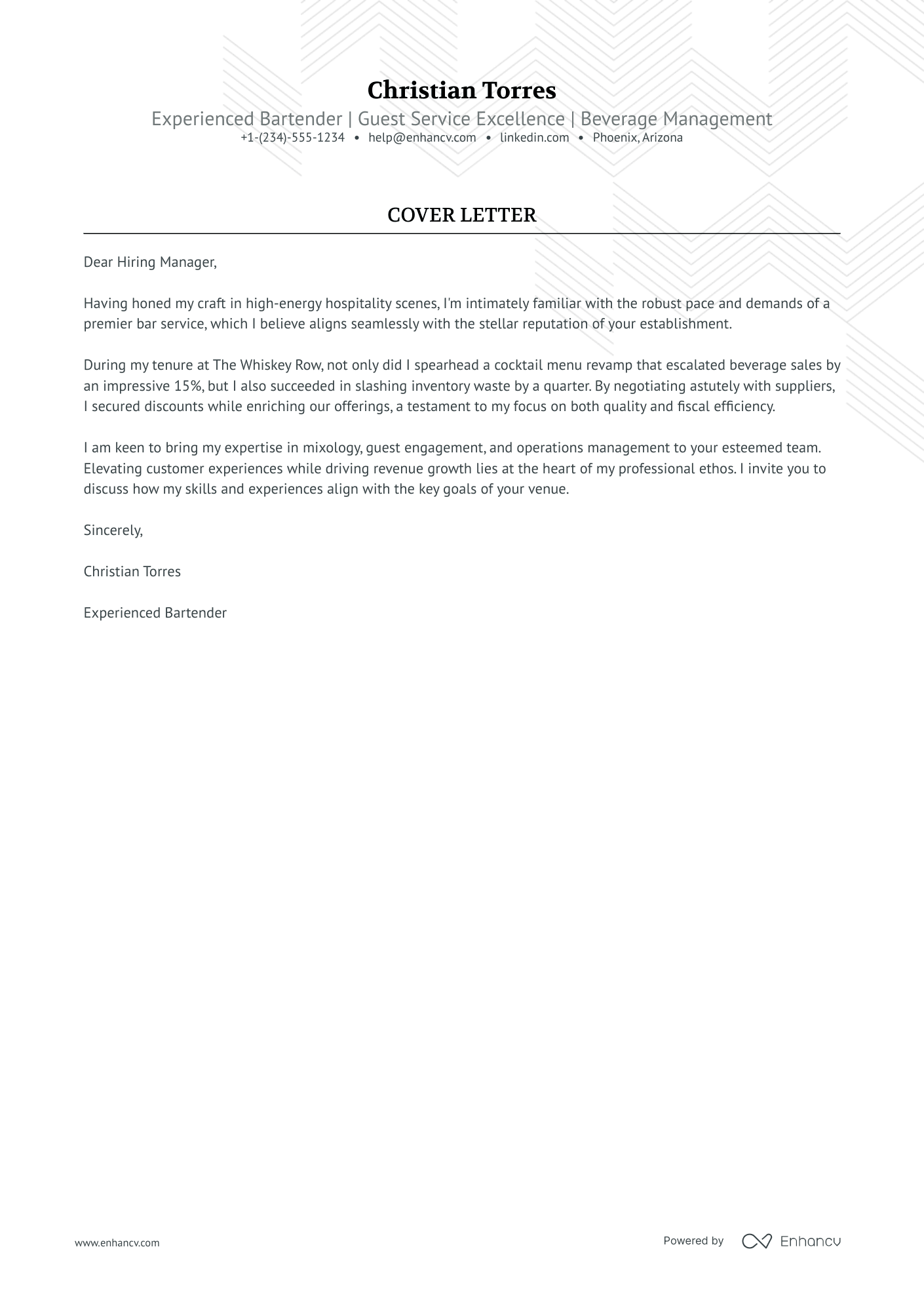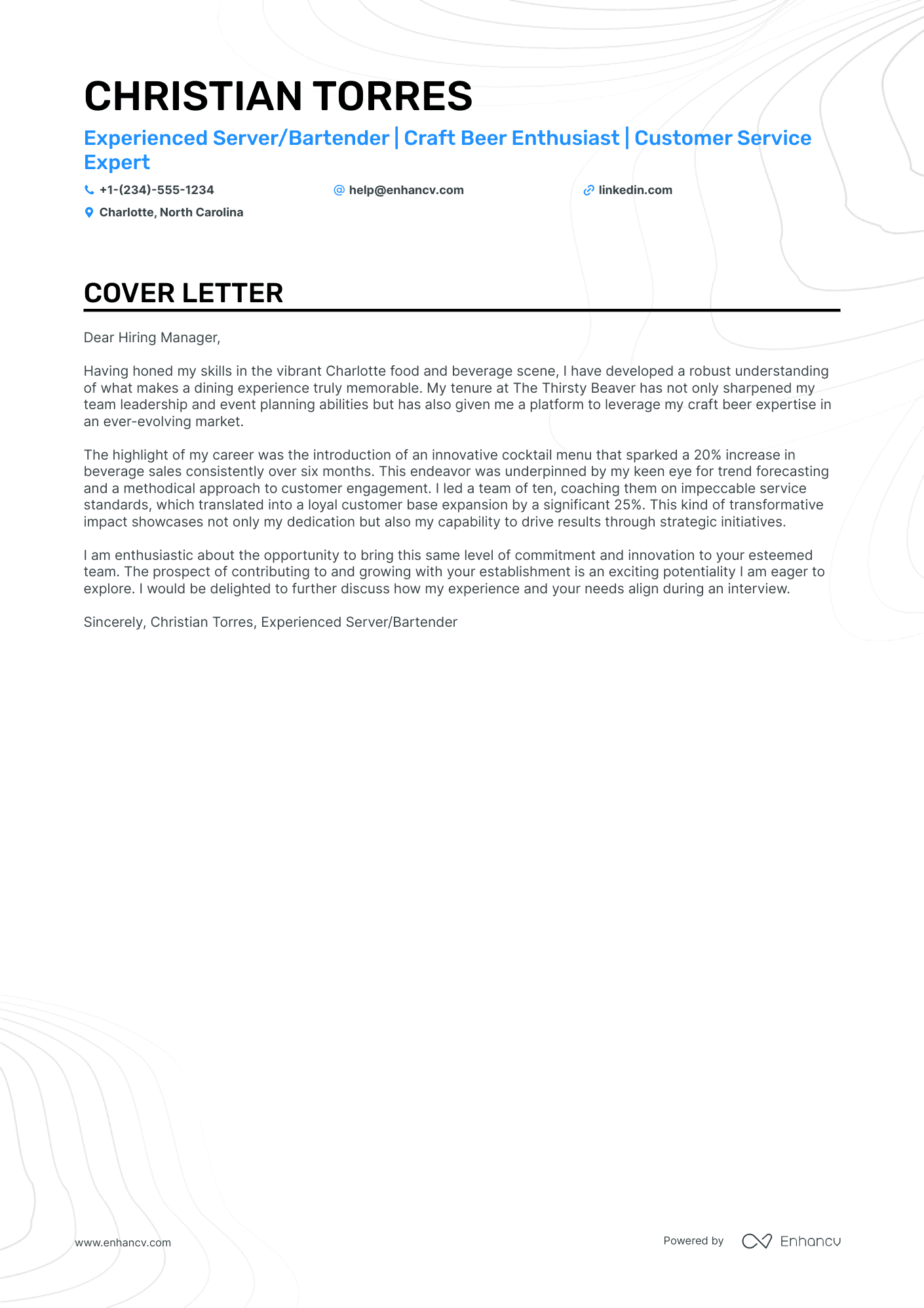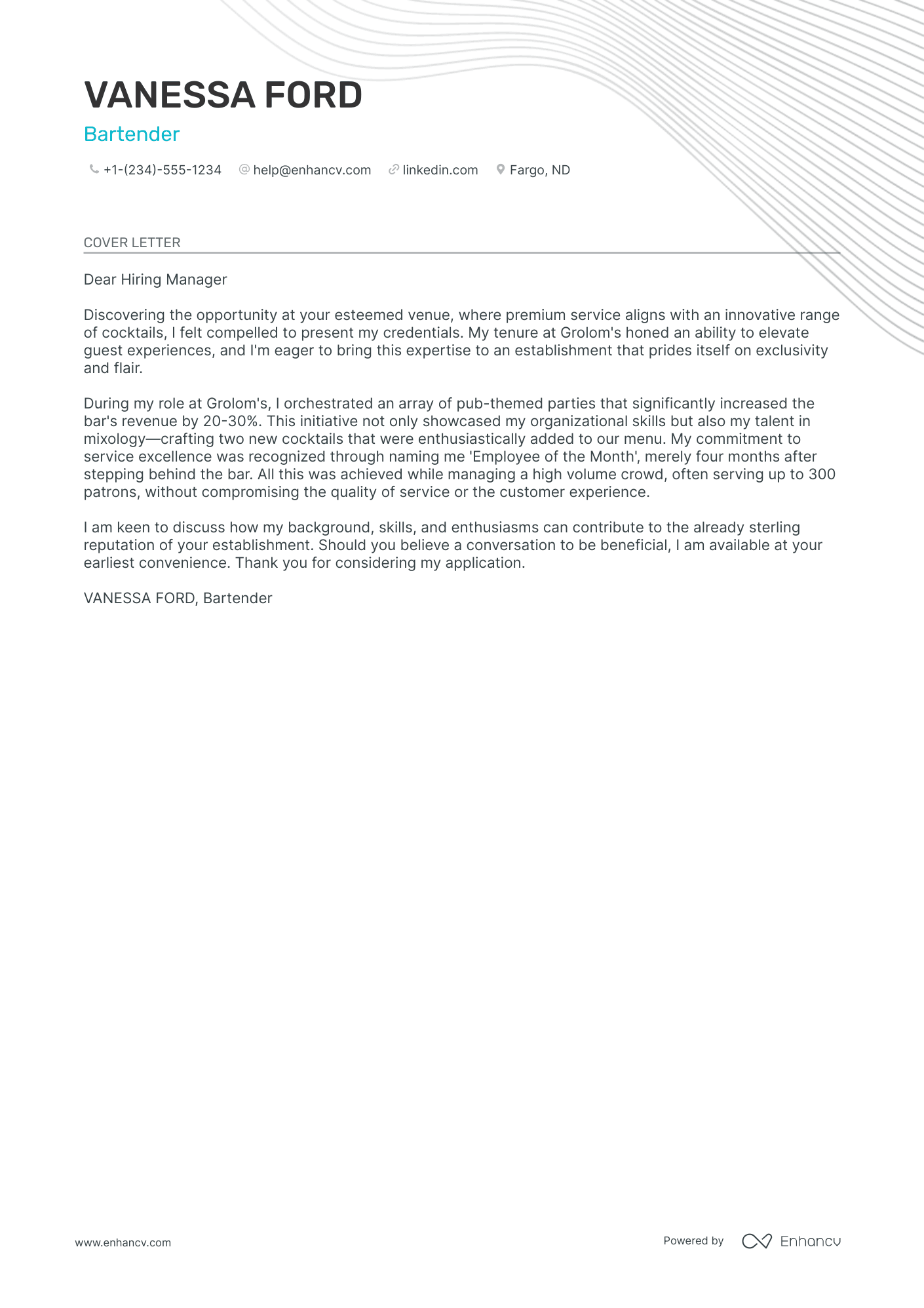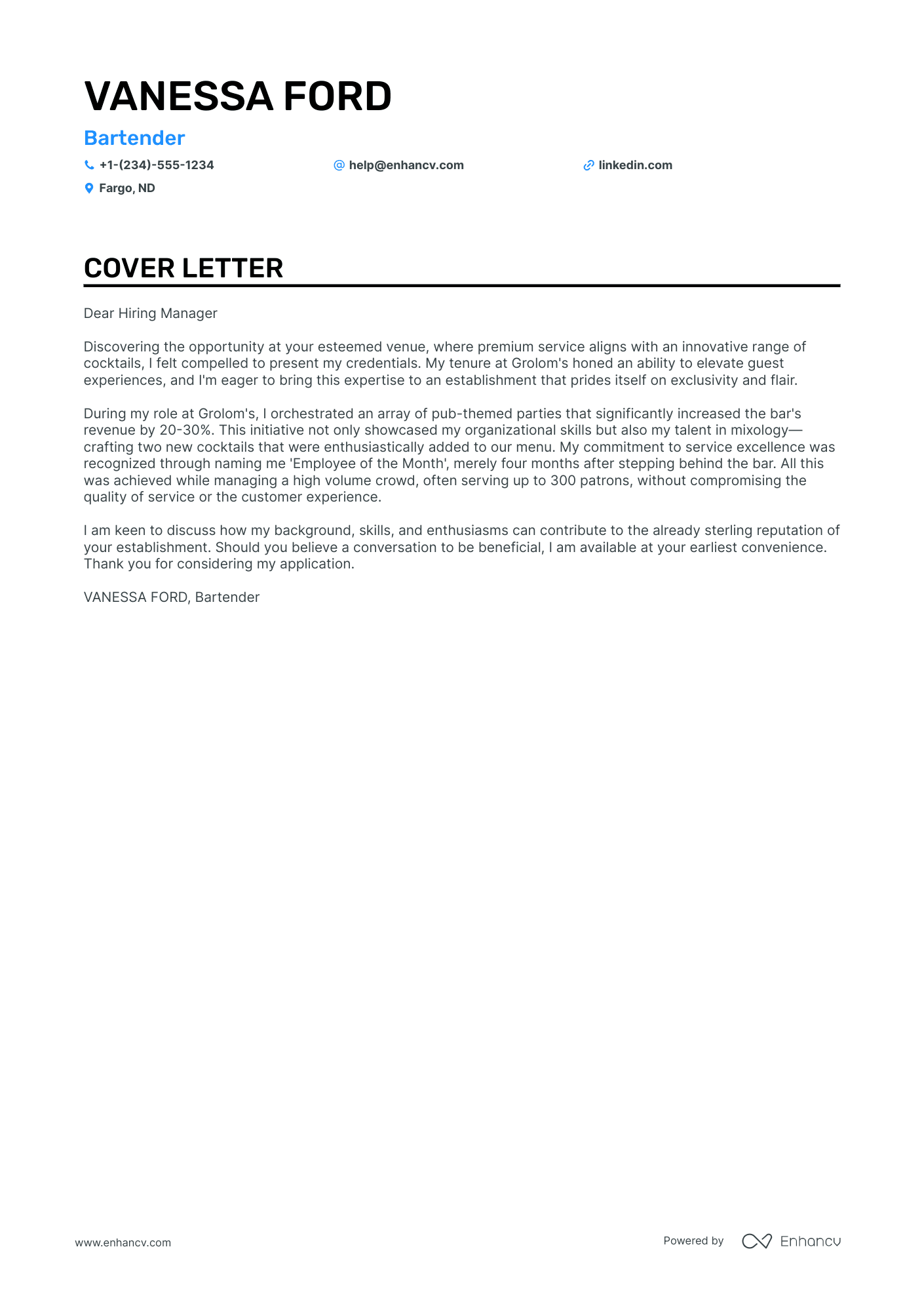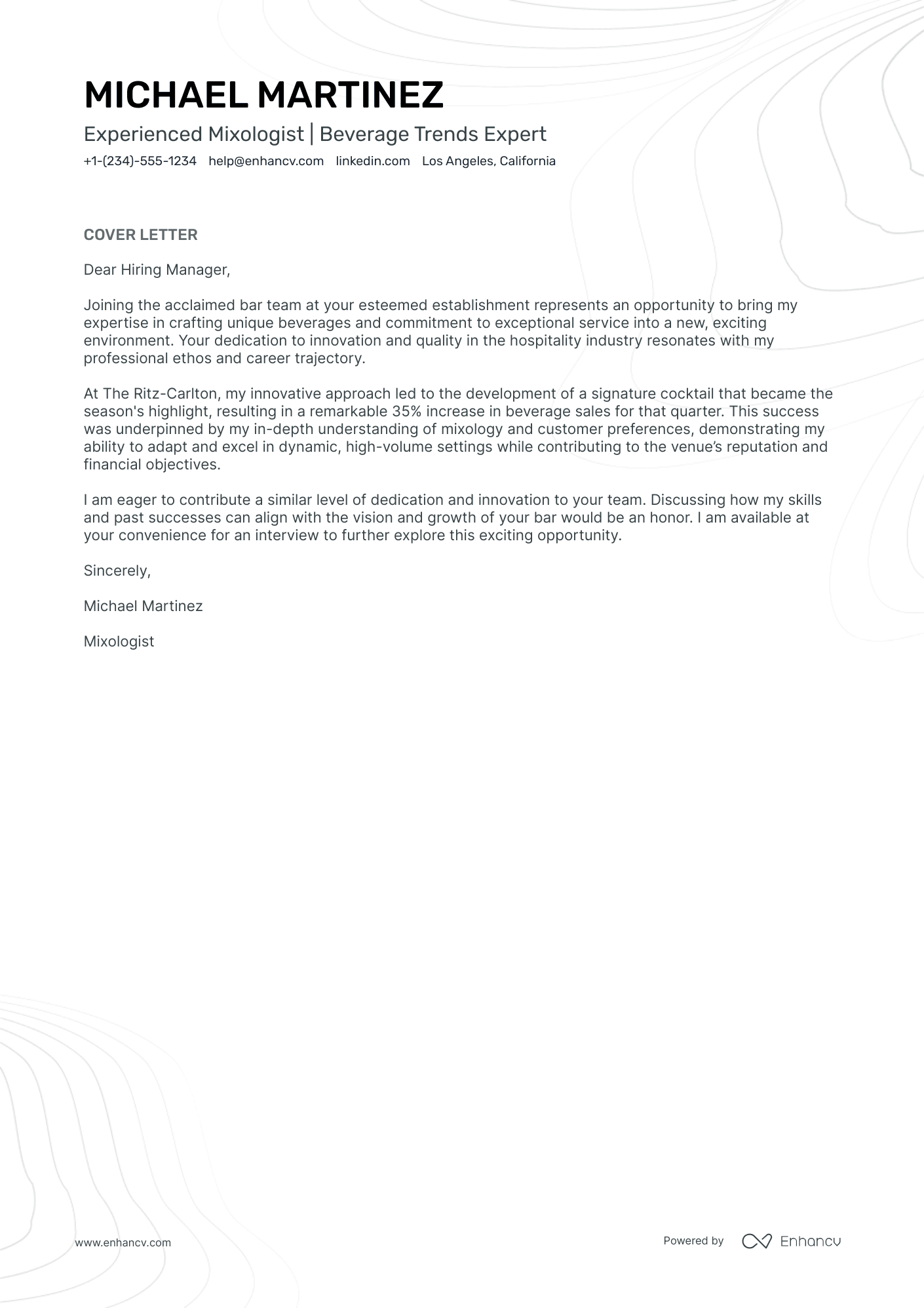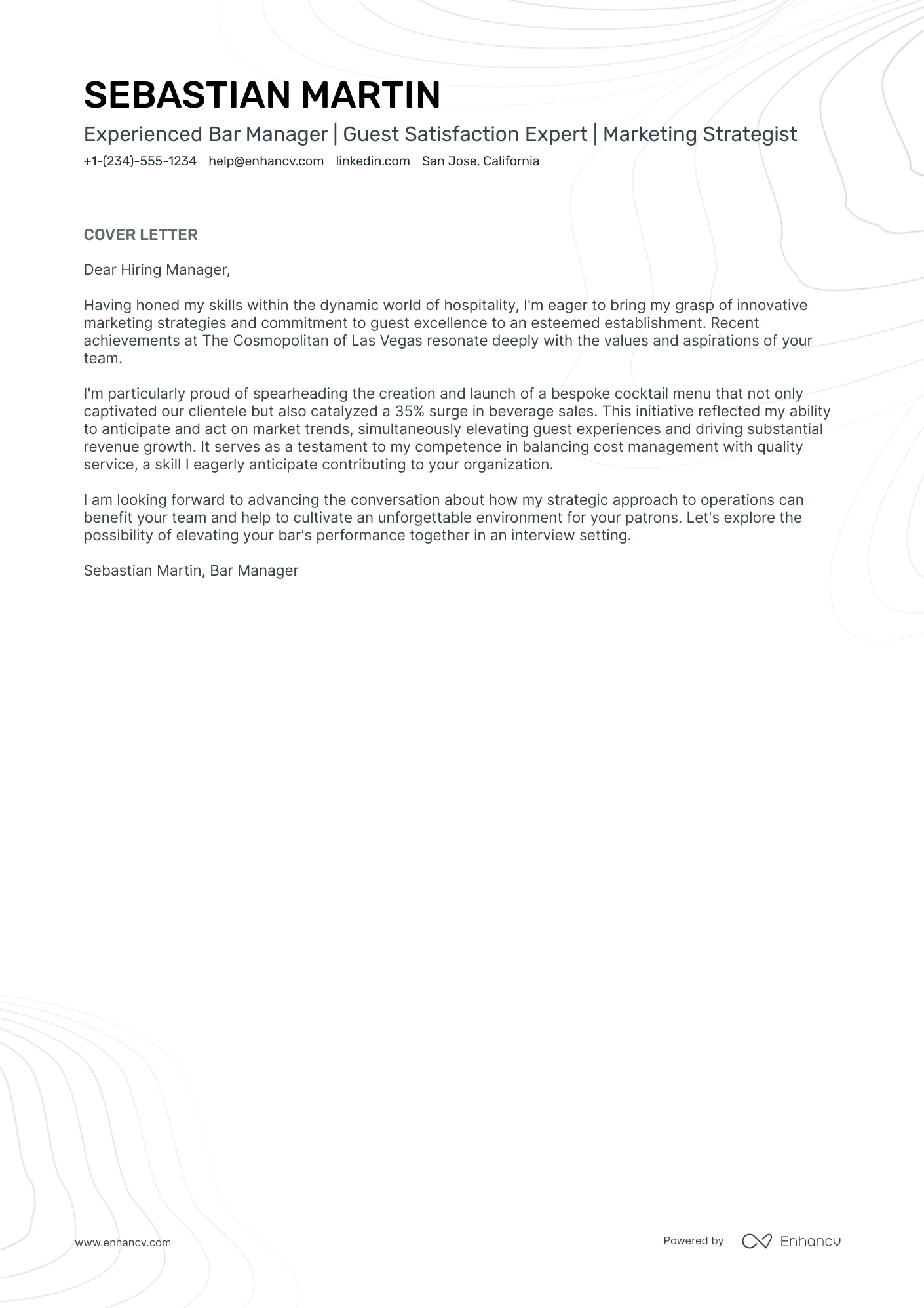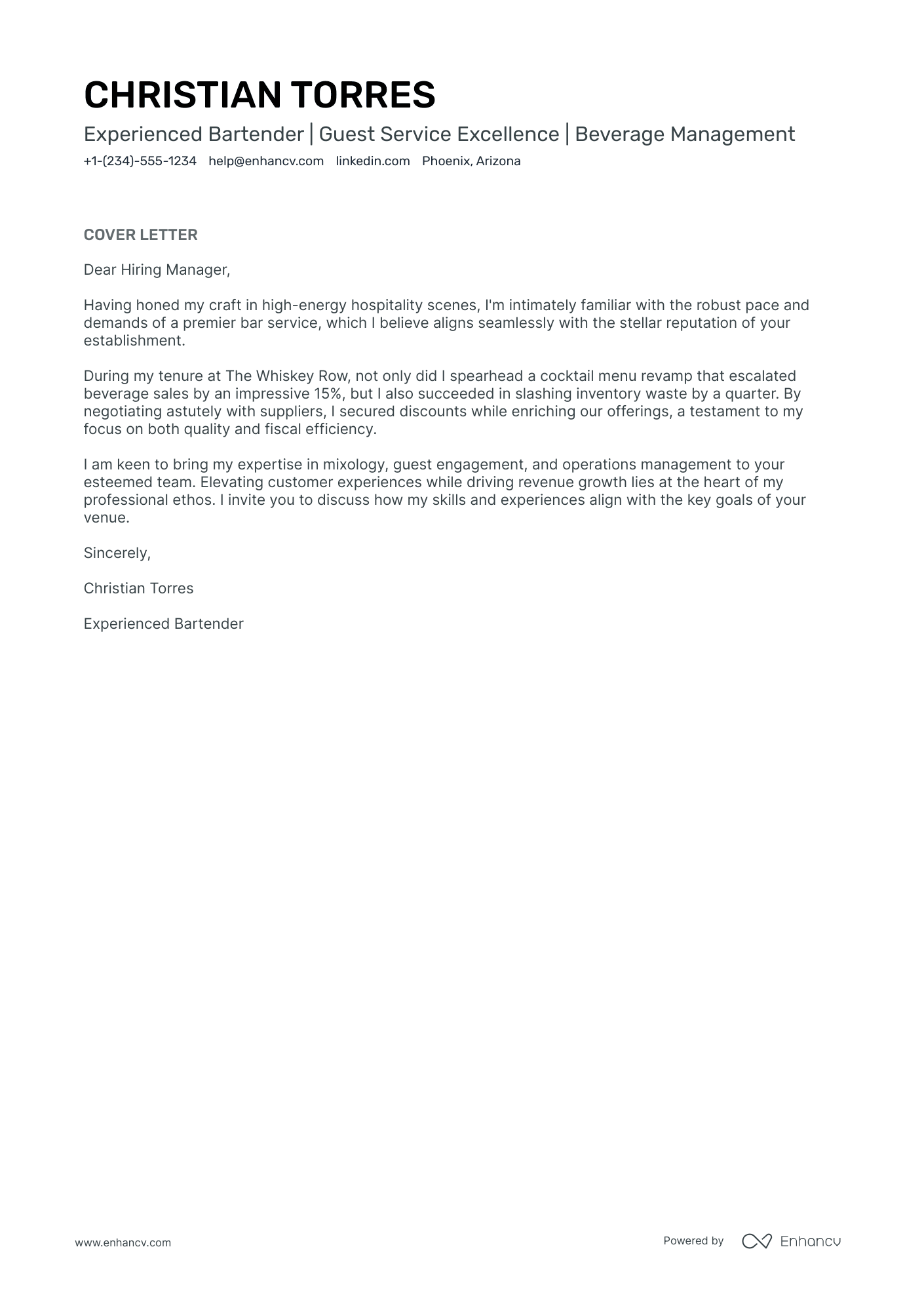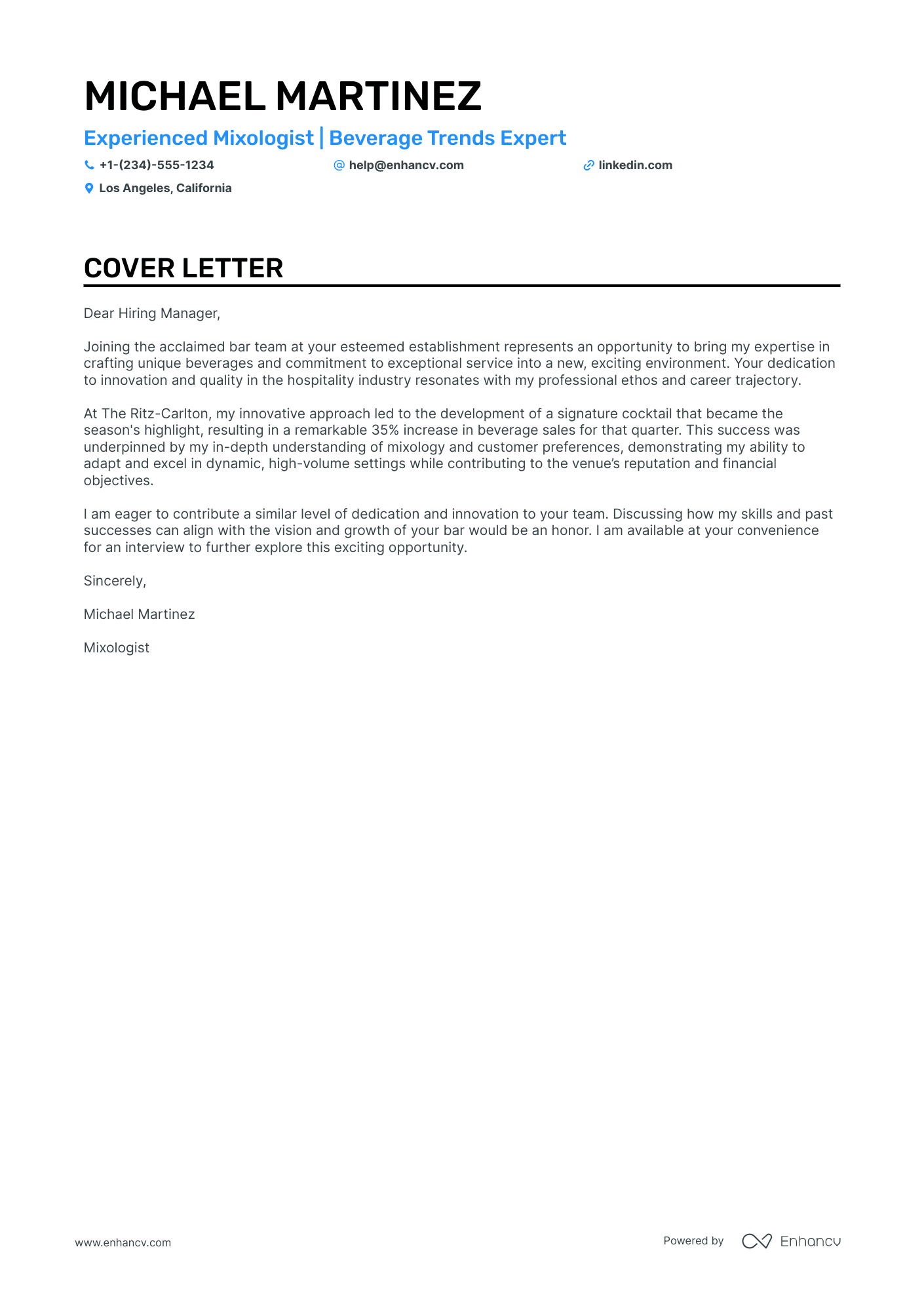Crafting a bartender cover letter can be a tough shake, especially when you're in the thick of job hunting and realize it's not just about listing skills. Your cover letter is your chance to mix up a story that captures your proudest professional moment—without just echoing your resume. To stand out, serve up formality with a twist, sidestepping well-worn phrases, and keep it concise; a single page should do the trick. Let's start stirring that perfect introduction.
- Personalize your bartender cover letter and get inspired by other professionals to tell a compelling story;
- Format and design your bartender cover letter to make an excellent first impression;
- Introduce your best achievement in your bartender cover letter to recruiters;
- How to make sure recruiters get in touch with you, using your bartender cover letter greeting and closing paragraphs.
What is more, did you know that Enhancv's AI can write your cover letter for you? Just upload your bartender resume and get ready to forward your job application in a flash.
If the bartender isn't exactly the one you're looking for we have a plethora of cover letter examples for jobs like this one:
- Bartender resume guide and example
- Fine Dining Bartender cover letter example
- Fine Dining Server cover letter example
- Food Service Manager cover letter example
- Lead Server cover letter example
- Restaurant General Manager cover letter example
- Guest Relations Manager cover letter example
- Pastry Chef cover letter example
- High Volume Bartender cover letter example
- Prep Cook cover letter example
- Food and Beverage Manager cover letter example
Drop your resume here or choose a file.
PDF & DOCX only. Max 2MB file size.
Bartender cover letter example
VANESSA FORD
Fargo, ND
+1-(234)-555-1234
help@enhancv.com
- Highlighting relevant experience: Mentioning tenure at a previous establishment (Grolom's) showcases a track record of industry experience and success in a directly related role.
- Quantifiable achievements: Including specific metrics, such as increasing the bar’s revenue by 20-30%, provides tangible evidence of the candidate’s contribution to business growth and capability in event organization.
- Special skills and recognition: Detailing the creation of new cocktails that were added to the menu and recognition as 'Employee of the Month' underscores the candidate's creativity, mixology talent, and dedication to service excellence.
What are the basics of the design or format of your bartender cover letter?
To start, here's a reminder for you: the Applicant Tracker System (or software that is used to assess candidate profiles), won't be reading your bartender cover letter.
Recruiters enjoy reading bartender cover letters with a standardized format that uses:
- the same font as the resume (e.g. modern ones like Raleway or Volkhov are prefered over the clichéd Times New Roman or Arial);
- single spacing to keep the content concise and organized (this is all ready for you in our cover letter templates);
- a one-inch margin to wrap around the text, like in our cover letter builder;
- PDF as a file format, as it allows your design (and visual element) to stay the same.
Finally, we can't go on without mentioning the key sections of your bartender cover letter.
In the top one-third, make sure to include a header (with your contact information, name, role, and date), a salutation, and an introduction.
Next, follows the heart and soul of your bartender cover letter or its body.
End your bartender cover letter with a closing paragraph and, if you wish, a signature.
Let us save you time! With our free cover letter generator, you can create a professional letter instantly using your resume.
The top sections on a bartender cover letter
Header: Includes the bartender's name, contact information, and date, which ensures that the recruiter can easily identify and respond to the applicant.
Greeting: Targets the hiring manager by name if possible, demonstrating attention to detail and personalization, qualities important for creating a welcoming atmosphere in a bar setting.
Introduction: Briefly introduces the bartender and their enthusiasm for the position, setting the tone for the cover letter and grabbing the reader's attention with a hint of their personality.
Experience and Skills: Highlights the bartender's relevant experience, mixology skills, and customer service expertise, which are crucial for showing the ability to thrive in a fast-paced bar environment.
Closing and Call to Action: Politely wraps up the letter and includes a compelling call to action, expressing eagerness for a personal interview to discuss how the bartender can contribute to the establishment's success.
Key qualities recruiters search for in a candidate’s cover letter
- Mixology Expertise: Knowledge of cocktail recipes, ingredients, and preparation techniques is essential for creating a diverse range of high-quality beverages.
- Customer Service Skills: Exceptional interpersonal abilities to engage with patrons, understand their preferences, and ensure a memorable experience.
- Cash Handling and POS (point of sale) Experience: Familiarity with processing transactions accurately and efficiently is vital for maintaining the establishment's financial integrity.
- Speed and Efficiency: The ability to work quickly without compromising quality, important during peak hours to keep customers happy and reduce wait times.
- Inventory Management: Knowledge of stock rotation, ordering supplies, and minimizing waste to maintain the bar's profitability and clean appearance.
- Conflict Resolution: The capacity to manage and diffuse tense situations professionally, ensuring a safe and enjoyable environment for all guests.
How to start your bartender cover letter: with a greeting, of course
Have you ever considered just how powerful a personalized salutation can be?
We sure have news for you! Your bartender cover letter should start with the right salutation to recruiters, nurturing a sense of respect and individuality.
Greet recruiters by using their first name (e.g. "Dear Tom" or "Dear Patricia") if you've previously established contact with them.
Otherwise, opt out for the less familiar, "Dear Ms. Peaches" or "Dear Ms Kelsey", if you've found the recruiter's name on LinkedIn or a corporate website.
"To whom it may concern" is never a good option, as it creates a sense that you've been sending out your bartender cover letter to anyone. Instead, use "Dear HR team" or "Dear (company name) recruiter" for a feeling of exclusivity.
List of salutations you can use
- Dear Hiring Manager,
- Dear [Hotel/Bar/Restaurant Name] Team,
- Dear [First Name Last Name],
- Dear [Job Title],
- Dear [Mr./Ms./Dr. Last Name],
- Dear Hiring Committee,
What to include in those first two sentences, or your bartender cover letter introduction
Have you ever wondered what the best way is to present your profile in the bartender cover letter introduction?
There's no right or wrong answer if you're being concise and authentic to yourself.
Some professionals start their bartender cover letter by:
- congratulating the company - focusing on something impressive, whether that's an award, an industry-leading project, or a key event;
- aligning their passion for the field or industry with the job - if you're enthusiastic about what you do, you'd thus grow your skill set and value as a professional.
How to select your best achievement for the middle, or the bartender cover letter body
You probably feel exhausted by this point in your application: you've dived into all the details of your success and skills in your bartender resume.
What else can you include in your bartender cover letter body?
Well, for starters, the next three to six paragraphs should show you further value as a professional. Or, why should recruiters choose you?
Think back on a noteworthy achievement that answers key job requirements and dive deep.
Structure your bartender cover letter middle as you'd a story: following chronological logic and highlighting outcomes, thanks to skills.
At the end of the day, you'd want recruiters to be able to see you as the best candidate for the role and understand more about who you are and what makes your success unique (and valuable to the role).
A sincere and original way to end your bartender cover letter
When writing their bartender cover letter, candidates tend to use one of these phrases, "Sincerely yours" or "I look forward to hearing from you".
Both statements show good manners, but your cover letter should end in a more actionable manner.
Write about:
- how you see yourself growing in the role/organization;
- the benefits you would bring about (you'd impress even more with tangible metrics);
- the next steps in the process (provide your availability for interviews).
Lacking experience: here's how to write your bartender cover letter
As a candidate with no experience, it's important to be honest from the get-go of your application.
Use your bartender cover letter to sell your unique talents. Choose an accomplishment from your academic background or your volunteer work to show the skills that are relevant to the role.
Focus on your career objectives and how you see the job to align with them. Be specific and, at the same time, realistic about where you picture yourself in five years.
Key takeaways
Writing your bartender cover letter doesn't need to turn into an endless quest, but instead:
- Create an individual bartender cover letter for each role you apply to, based on job criteria (use our builder to transform your resume into a cover letter, which you could edit to match the job);
- Stick with the same font you've used in your resume (e.g. Raleway) and ensure your bartender cover letter is single-spaced and has a one-inch margin all around;
- Introduce your enthusiasm for the role or the company at the beginning of your bartender cover letter to make a good first impression;
- Align what matters most to the company by selecting just one achievement from your experience, that has taught you valuable skills and knowledge for the job;
- End your bartender cover letter like any good story - with a promise for greatness or follow-up for an interview.
Bartender cover letter examples
By Experience
Entry-Level Bartender
Senior Bartender
By Role
